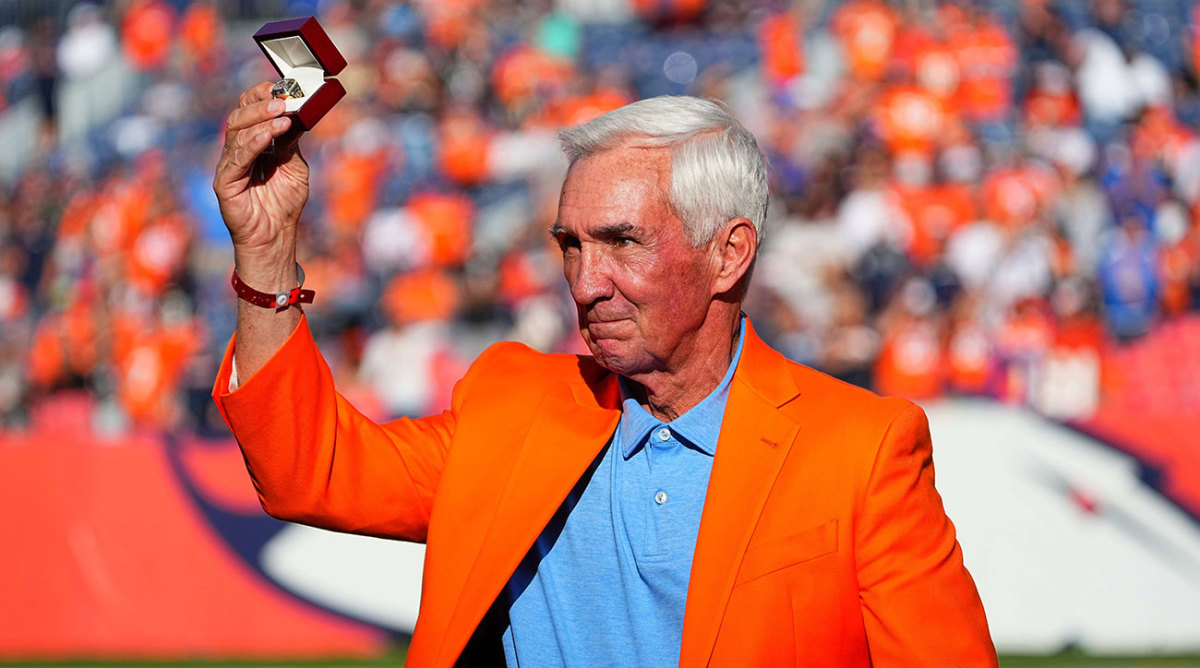Why Mike Shanahan’s Induction Into the Pro Football Hall of Fame Is Long Overdue

On Tuesday, a dozen worthy candidates will be presented to the Pro Football Hall of Fame contributors committee. There are a handful who could easily be voted through without much dispute. Just one will be selected, and that one almost certainly will be rubber-stamped by the larger committee for induction in the class of 2024.
To me, there’s really only one on the list who’s a head-scratcher. And by head-scratcher, I mean, you wonder how the guy is not in already.
That guy is Mike Shanahan.

Now, to be clear, my feeling is Shanahan and Patriots owner Robert Kraft are probably neck and neck for the one spot that’ll be awarded, and Kraft’s getting through is overdue, too. Former Giants coach Tom Coughlin also has a solid case, and it’s possible the coaches on the list will cannibalize each other in the voting, the same way receivers Tim Brown, Andre Reed and Cris Carter once did (all three eventually got in) in the general vote. Dan Reeves, Shanahan’s old boss in Denver, also deserves consideration for all he did for football.
That said, again, it’s really wild that Shanahan’s not already in the Hall of Fame. The numbers he compiled, both in building programs and calling offenses, are off the charts. He’s the only one of five eligible coaches to win back-to-back Super Bowls (XXXII and XXXIII with the Broncos) who hasn’t already been inducted. He’s the only coach in history to be play-caller for seven straight top-three offenses. He walked away from coaching with a winning record against Bill Belichick and Andy Reid.
Statistically, over his final 20 years on the sidelines (1992 to 2012, excluding ’09), his teams cumulatively led the NFL in rushing yards and total yards, and were second in points, fourth in regular-season wins, fourth in playoff wins and fifth in passing yards.
And all of this is before even getting to the part that best illustrates how he embodies the category he’s being considered in: contributor.
In the ’90s, he and famed line coach Alex Gibbs basically changed the way the NFL runs the ball permanently. Their zone-blocking-based scheme led Hall of Famer Terrell Davis to regular-season and Super Bowl MVPs, and a parade of backs (Olandis Gary, Mike Anderson, Clinton Portis, Reuben Droughns, Tatum Bell) to 1,000-yard years. And while Denver won, a coaching pipeline was established, which grew legs when Shanahan went to Washington.
Ten years after his final season there, his offense is legitimately everywhere. Twelve of the NFL’s 32 offenses are called by a direct descendent of his coaching tree, and marks of it are all over the league. Over the last four years, all four head coaches who came from his Washington staff—his son, Kyle; Sean McVay; Matt LaFleur; and Mike McDaniel—have made the playoffs. McDaniel did so last year, in his first year as a head coach. The other three have made it to conference title games, with two having gone to Super Bowls and McVay having won one.
That Washington staff also, for what it’s worth, moved the NFL forward in adapting college concepts to the pro game in a way that hadn’t been done and led to Robert Griffin III’s historic rookie year. A decade later, using such systems to ease the transition for young quarterbacks to pro football is exceedingly common.
And if you don’t believe it, well, you can ask just about anyone who worked with him.
“Incredible coach, incredible leader. The back-to-back Super Bowls speak for themselves,” McVay said late Monday night in support of his old boss from Washington. “But the influence he’s had on this game, whether it be with Kyle and all of us or others, he always just had such an eye for not only for developing players but also coaches. He definitely cemented his legacy, made a huge imprint on the history of this game with what he did, and I think more importantly the influence that he’s had on so many other people that’ll continue on.
“It seems like a no-brainer to me that this guy should be in. I sure am grateful for him and everything he’s done for me. The man, the leader, the communicator, the work capacity, the work ethic, the ability to see things in people that maybe they didn’t even see in themselves, whether it be players or coaches, that’s Mike Shanahan. Hopefully our guy gets in. He certainly deserves it.”
So, as McVay said, he has wins, generational offensive innovation, a rich coaching pipeline developed and a history of maximizing players (Davis, John Elway and Steve Young all won MVP awards playing for Shanahan) on his résumé, and it all brings you back to the original question.
How is he not already in?
For a few years, as it is with many coaches, it probably tied to the fear that he’d pull up stakes on retirement and return to the sideline. Then, it was probably waiting his turn in line, and that’s been cleaned up, too, with Tony Dungy, Bill Cowher, Jimmy Johnson, Tom Flores, Dick Vermeil and Don Coryell all coming off the board over the last seven years. Soon, though, it’ll get to the point where it’s pretty glaring that the Godfather of the NFL’s most productive coaching tree and most prevalent offense isn’t in.
That is, if we’re not already there.
